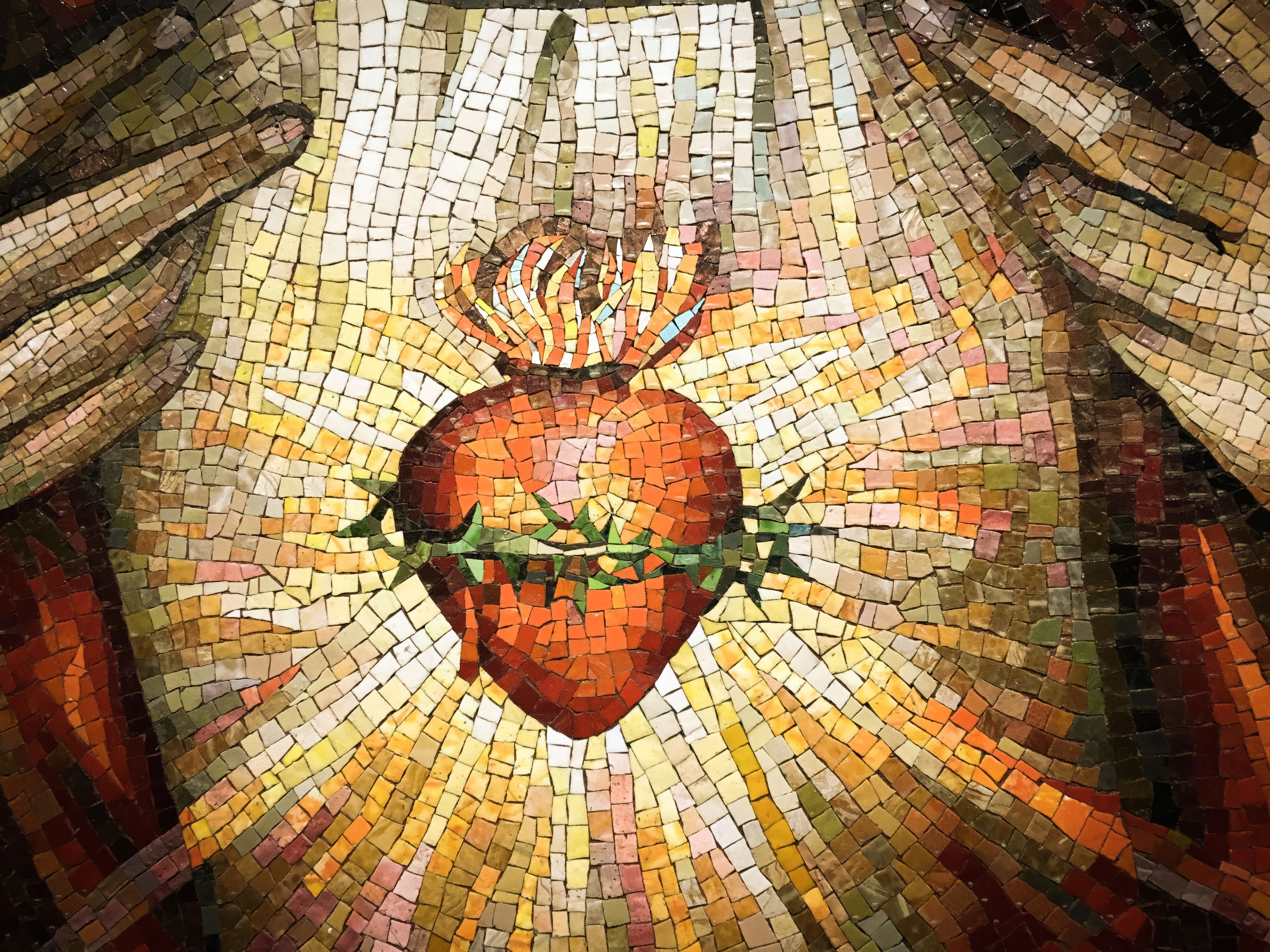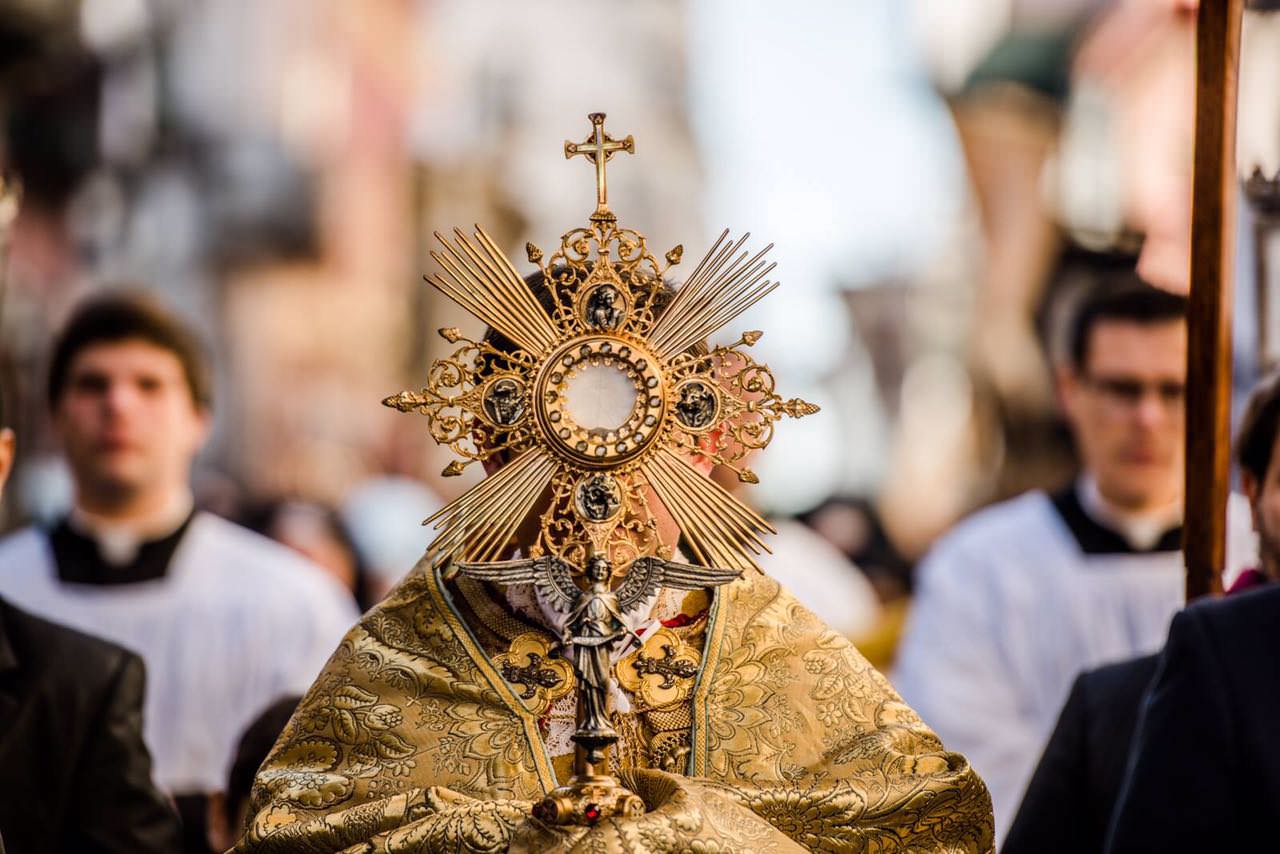Sometimes living a good Christian life can seem like a lot can’t it? If we read through the Old Testament they had many more laws than we have today, mostly ceremonial or liturgical, but even still they were allowed certain things that Jesus very clearly condemns in the New Testament. One good example would be how Moses allowed divorce because of the hardness of their hearts.
So it seems like Jesus in the Gospel today is making an already difficult faith even harder to attain. He says we have heard that murder is wrong, but he wants us not even to be angry with our brothers and sisters. How is this even possible and why are there differences between the Old Testament allowances and what Jesus allows? Well, let’s look very practically at the situation. What is the difference? The difference is Jesus himself.
The people in the Old Testament did not have Jesus. They did not yet have the power of the cross, except for specific examples of some of the prophets who God gave grace to in a very special way. They did not have the power of the sacraments that Christ instituted. It becomes clear with this context that the reason the Israelites hearts were so hardened was because they didn’t have Jesus.
Now Jesus comes on the scene and I think the proper way to look at it is not that Jesus is giving us impossible things to follow, but that he is showing us the new heights of holiness we can attain through his love, grace, and the power of the cross. He is the difference.
This relates back to the Gospel I reflected on earlier this month. Jesus makes it clear that the Sadducees do not believe in the Scriptures and the power of God. It’s as if they are living in the old way without reference to the change. They are trying to abide by the old law without realizing that Christ has come with his power to save us all from our sins and give us the ability to attain a higher standard of holiness.
For any video game nerds out there, Jesus gives us the power to level up. What’s more, Jesus shows us that it was always meant to be this way. He never wanted our hearts to become hardened with sin. From the beginning, he wanted us to receive his love and grace and allow it to change our lives. We are the ones who allowed sin to change the plan. But even in our wretchedness, God had the plan for our future. He sent his only Son so that whoever would believe in him would have eternal life. So how do we surpass the righteousness of the scribes and Pharisees as Jesus calls us to in today’s Gospel. We look to him. Jesus is the difference.
From all of us here at Diocesan, God bless!
A veces vivir una buena vida cristiana puede parecer mucho, ¿no es cierto? Si leemos el Antiguo Testamento, tenían muchas más leyes que las que tenemos hoy, en su mayoría ceremoniales o litúrgicas, pero aún así se les permitían ciertas cosas que Jesús condena muy claramente en el Nuevo Testamento. Un buen ejemplo sería cómo Moisés permitió el divorcio debido a la dureza de sus corazones.
Entonces parece que Jesús en el Evangelio de hoy está haciendo que una fe que ya era difícil sea aún más difícil de alcanzar. Dice que hemos oído que el asesinato está mal, pero quiere que ni siquiera nos enfademos con nuestros hermanos y hermanas. ¿Cómo es esto posible y por qué hay diferencias entre las concesiones del Antiguo Testamento y lo que Jesús permite? Bueno, veamos la situación de manera muy práctica. ¿Cuál es la diferencia? La diferencia es Jesús mismo.
La gente del Antiguo Testamento no tenía a Jesús. Todavía no tenían el poder de la cruz, salvo ejemplos específicos de algunos de los profetas a quienes Dios dio gracia de una manera muy especial. No tenían el poder de los sacramentos que Cristo instituyó. Con este contexto queda claro que la razón por la que los corazones de los israelitas estaban tan endurecidos era porque no tenían a Jesús.
Ahora Jesús entra en escena y creo que la forma correcta de verlo no es que Jesús nos esté dando cosas imposibles de seguir, sino que nos esté mostrando las nuevas alturas de santidad que podemos alcanzar a través de su amor, su gracia y el poder de la cruz. Él es la diferencia.
Esto se relaciona con el Evangelio sobre el que reflexioné a principios de este mes. Jesús deja claro que los saduceos no creen en las Escrituras ni en el poder de Dios. Es como si vivieran de la forma antigua sin tener en cuenta el cambio. Están tratando de cumplir con la antigua ley sin darse cuenta de que Cristo ha venido con su poder para salvarnos a todos de nuestros pecados y darnos la capacidad de alcanzar un nivel más alto de santidad.
Para cualquier nerd de los videojuegos, Jesús nos da el poder de subir de nivel. Es más, Jesús nos muestra que siempre debió ser así. Él nunca quiso que nuestros corazones se endurecieran por el pecado. Desde el principio, quiso que recibiéramos su amor y gracia y permitiéramos que cambiaran nuestras vidas. Nosotros somos los que permitimos que el pecado cambiara el plan. Pero incluso en nuestra miseria, Dios tenía el plan para nuestro futuro. Envió a su único Hijo para que todo aquel que creyera en él tuviera vida eterna. Entonces, ¿cómo superamos la justicia de los escribas y fariseos como nos llama Jesús en el Evangelio de hoy? Nos fijamos en él. Jesús es la diferencia.
De parte de todos nosotros aquí en Diocesano, ¡Dios los bendiga!

Tommy Shultz is a Business Development Representative for Diocesan. In this role he is committed to bringing the best software to dioceses and parishes while helping them evangelize on the digital continent. Tommy has worked in various diocese and parish roles since his graduation from Franciscan University with a Theology degree. He hopes to use his skills in evangelization, marketing, and communications, to serve the Church and bring the Good News to all. His favorite quote comes from St. John Paul II, who said, “A person is an entity of a sort to which the only proper and adequate way to relate is love.”
Feature Image Credit: Clark Tibbs, unsplash.com/photos/do-something-great-neon-sign-oqStl2L5oxI


 David Dashiell is a freelance author and editor in Nashville, Tennessee. He has a master’s degree in theology from Franciscan University, and is the editor of the anthology
David Dashiell is a freelance author and editor in Nashville, Tennessee. He has a master’s degree in theology from Franciscan University, and is the editor of the anthology 
 Elizabeth Tomlin is the author of Joyful Momentum: Building and Sustaining Vibrant Women’s Groups and contributing author to the Ave Prayer Book for Catholic Mothers. She is General Counsel for the Archdiocese for the Military Services, USA. Elizabeth is an Army wife and mother of three and currently lives in the DC area. She blogs at
Elizabeth Tomlin is the author of Joyful Momentum: Building and Sustaining Vibrant Women’s Groups and contributing author to the Ave Prayer Book for Catholic Mothers. She is General Counsel for the Archdiocese for the Military Services, USA. Elizabeth is an Army wife and mother of three and currently lives in the DC area. She blogs at 



 Allison Gingras (
Allison Gingras ( 
 Kathryn Mulderink, MA, is married to Robert, Station Manager for Holy Family Radio. Together they have seven children (including Father Rob), and eight grandchildren. She is President of the local community of Secular Discalced Carmelites and has published five books and many articles. Over the last 30 years, she has worked as a teacher, headmistress, catechist, Pastoral Associate, and DRE, and as a writer and voice talent for Catholic Radio. Currently, she serves the Church by writing and speaking, and by collaborating with various parishes and to lead others to encounter Christ and engage their faith. Her website is
Kathryn Mulderink, MA, is married to Robert, Station Manager for Holy Family Radio. Together they have seven children (including Father Rob), and eight grandchildren. She is President of the local community of Secular Discalced Carmelites and has published five books and many articles. Over the last 30 years, she has worked as a teacher, headmistress, catechist, Pastoral Associate, and DRE, and as a writer and voice talent for Catholic Radio. Currently, she serves the Church by writing and speaking, and by collaborating with various parishes and to lead others to encounter Christ and engage their faith. Her website is 
 Kate Taliaferro is an Air Force wife and mother. She is blessed to be able to homeschool, bake bread and fold endless piles of laundry. When not planning a school day, writing a blog post or cooking pasta, Kate can be found curled up with a book or working with some kind of fiber craft. Kate blogs at
Kate Taliaferro is an Air Force wife and mother. She is blessed to be able to homeschool, bake bread and fold endless piles of laundry. When not planning a school day, writing a blog post or cooking pasta, Kate can be found curled up with a book or working with some kind of fiber craft. Kate blogs at 



 Tami Urcia grew up in Western Michigan, a middle child in a large Catholic family. She spent early young adulthood as a missionary in Mexico, studying theology and philosophy, then worked and traveled extensively before finishing her Bachelor’s Degree in Western Kentucky. She loves tackling projects, finding fun ways to keep her little ones occupied, quiet conversation with the hubby and finding unique ways to love. She works full time at Diocesan, is a guest blogger on
Tami Urcia grew up in Western Michigan, a middle child in a large Catholic family. She spent early young adulthood as a missionary in Mexico, studying theology and philosophy, then worked and traveled extensively before finishing her Bachelor’s Degree in Western Kentucky. She loves tackling projects, finding fun ways to keep her little ones occupied, quiet conversation with the hubby and finding unique ways to love. She works full time at Diocesan, is a guest blogger on 
 Dr. Alexis Dallara-Marsh is a board-certified neurologist who practices in Bergen County, NJ. She is a wife to her best friend, Akeem, and a mother of two little ones on Earth and two others in heaven above.
Dr. Alexis Dallara-Marsh is a board-certified neurologist who practices in Bergen County, NJ. She is a wife to her best friend, Akeem, and a mother of two little ones on Earth and two others in heaven above.